Causes of Autism
There are various theories as to what causes the different forms of autism – including Asperger syndrome, autistic disorder and pervasive developmental disorder (not otherwise specified).
Most researchers believe that autism has a variety of causes.
Medical Research Council
‘Research over the last half-century has established autism as a neurodevelopmental disorder. Early suggestions that ASDs might result from abnormal parenting have been abandoned in the face of overwhelming evidence for a biological basis and a strong genetic component. Most researchers believe that ASDs have a variety of causes, perhaps all affecting the same brain systems, or impeding development through disruption of different abilities necessary for social and communicative development. Whether environmental factors interact with genetic susceptibility is as yet unclear.
– Medical Research Council. (2001). MRC review of autism research: Epidemiology and causes. London: MRC.
National Autistic Society
‘The causes of autism are still being investigated. Many experts believe that the pattern of behavior from which autism is diagnosed may not result from a single cause. There is strong evidence to suggest that autism can be caused by a variety of physical factors, all of which affect brain development – it is not due to emotional deprivation or the way a person has been brought up.’
‘There is evidence to suggest that genetic factors are responsible for some forms of autism. Scientists have been attempting to identify which genes might be implicated in autism for some years.’
– National Autistic Society. (2009). What causes autism?: National Autistic Society position statement. London: NAS
Autism Society of America
‘There is no known single cause for autism, but it is generally accepted that it is caused by abnormalities in brain structure or function. Brain scans show differences in the shape and structure of the brain in autistic versus non-autistic children. Researchers are investigating a number of theories, including the link between heredity, genetics and medical problems. In many families, there appears to be a pattern of autism or related disabilities, further supporting a genetic basis to the disorder. While no one gene has been identified as causing autism, researchers are searching for irregular segments of genetic code that autistic children may have inherited. It also appears that some children are born with a susceptibility to autism, but researchers have not yet identified a single “trigger” that causes autism to develop.’
–Autism Society of America. (200?). What causes autism? Bethesda, MA: ASA.
Diagnosis
A diagnosis is the formal identification of autism, usually by a multi-disciplinary diagnostic team, often including a speech and language therapist, pediatrician, psychiatrist and/or psychologist.
How autism is diagnosed
The characteristics of autism vary from one person to another, but in order for a diagnosis to be made, a person will usually be assessed as having had persistent difficulties with social communication and social interaction and restricted and repetitive patterns of behaviors, activities or interests since early childhood, to the extent that these “limit and impair everyday functioning”.
Signs of Autism
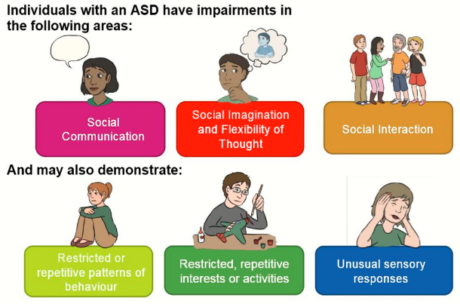
SOCIAL COMMUNICATION
Autistic people have difficulties with interpreting both verbal and non-verbal language like gestures or tone of voice. Many have a very literal understanding of language and think people always mean exactly what they say. They may find it difficult to use or understand:
- facial expressions
- tone of voice
- jokes and sarcasm.
Some may not speak or have fairly limited speech. They will often understand more of what other people say to them than they are able to express, yet may struggle with vagueness or abstract concepts. Some autistic people benefit from using or prefer to use, alternative means of communication, such as sign language or visual symbols. Some are able to communicate very effectively without speech.
Others have good language skills, but they may still find it hard to understand the expectations of others within conversations, perhaps repeating what the other person has just said (this is called echolalia) or talking at length about their own interests.
It often helps to speak in a clear, consistent way and to give autistic people time to process what has been said to them.
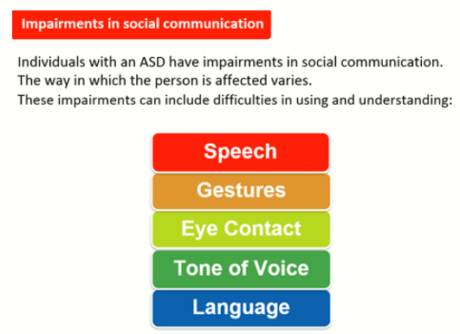
How this impacts on day to life:
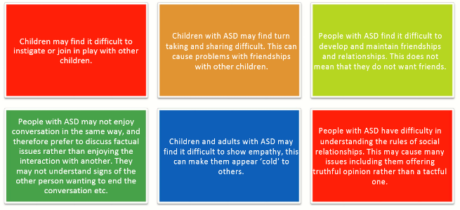 Social interaction
Social interaction
Autistic people often have difficulty ‘reading’ other people – recognizing or understanding others’ feelings and intentions – and expressing their own emotions. This can make it very hard for them to navigate the social world. They may:
- appear to be insensitive
- seek out time alone when overloaded by other people
- not seek comfort from other people
- appear to behave ‘strangely’ or in a way thought to be socially inappropriate.
Autistic people may find it hard to form friendships. Some may want to interact with other people and make friends but may be unsure how to go about it.
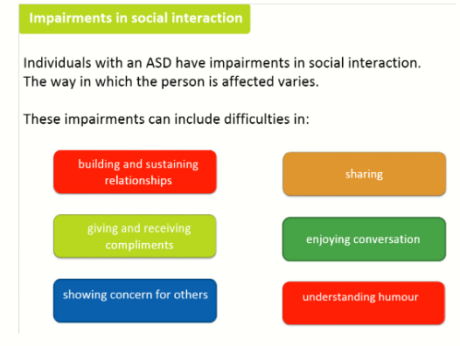 How this impacts on day to life:
How this impacts on day to life:
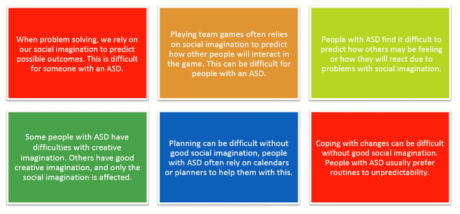 REPETITIVE BEHAVIOUR AND ROUTINES
REPETITIVE BEHAVIOUR AND ROUTINES
The world can seem a very unpredictable and confusing place to autistic people, who often prefer to have a daily routine so that they know what is going to happen every day. They may want to always travel the same way to and from school or work, or eat exactly the same food for breakfast.
The use of rules can also be important. It may be difficult for an autistic person to take a different approach to something once they have been taught the ‘right’ way to do it. People on the autism spectrum may not be comfortable with the idea of change, but may be able to cope better if they can prepare for changes in advance.
HIGHLY-FOCUSED INTERESTS
Many autistic people have intense and highly-focused interests, often from a fairly young age. These can change over time or be lifelong and can be anything from art or music, to trains or computers. An interest may sometimes be unusual. One autistic person loved collecting rubbish, for example. With encouragement, the person developed an interest in recycling and the environment.
Many channels their interest in studying, paid work, volunteering, or other meaningful occupation. Autistic people often report that the pursuit of such interests is fundamental to their wellbeing and happiness.

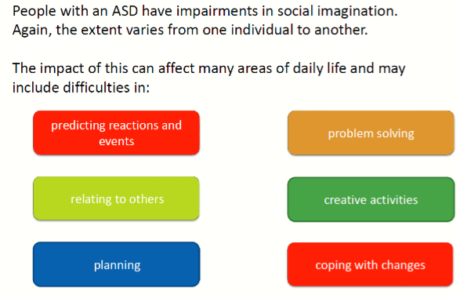 How this impacts on day to life:
How this impacts on day to life:
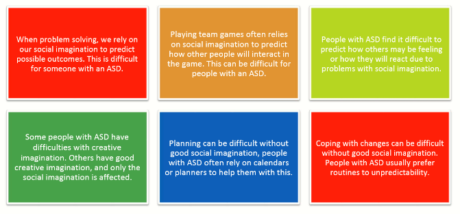 SENSORY SENSITIVITY
SENSORY SENSITIVITY
Autistic people may also experience over- or under-sensitivity to sounds, touch, tastes, smells, light, colors, temperatures or pain. For example, they may find certain background sounds, which other people ignore or block out, unbearably loud or distracting. This can cause anxiety or even physical pain. Or they may be fascinated by lights or spinning objects.
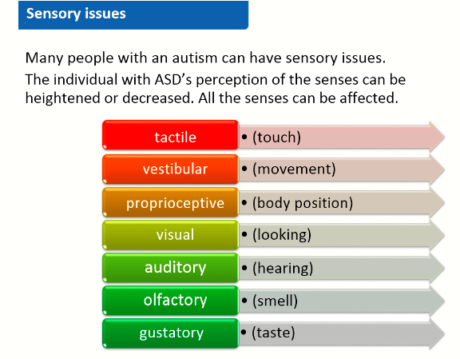 How this impacts on day to life:
How this impacts on day to life: 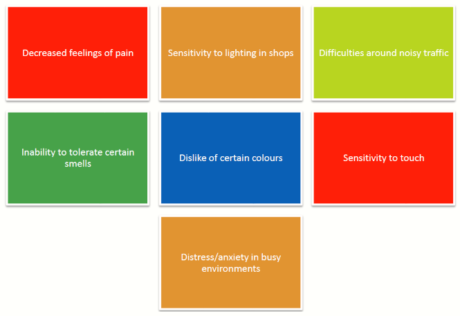 Anxiety
Anxiety
One of the things that many parents talk about is how anxious their child seems to be.
High levels of anxiety in children with an ASD are often a common feature and it is this feeling of anxiety that might be causing some of the behaviors that you may see in your child.
Your child might be feeling anxious about something but is not able to tell you. In fact, the way of communicating their anxiety is often through behavior. Some of the behaviors you might see are:
- Tantrums and aggressive behavior
- Becoming withdrawn and resisting any interaction with others
- Experiencing pain
- Become distressed
Anxiety and autism go hand in hand and it is more prevalent in children with autism because they have difficulty making sense of the world around them and understanding social rules. Causes of anxiety are numerous, which makes it very difficult for parents to know what to do or how to react.
We all experience anxiety, it is part of our everyday life and we all react to stressful situations in a way which is personal to us, but the symptoms of anxiety are often similar. Think of a time when you have felt anxious, you may have experienced feelings such as being scared, panic, increased heart rate, sweating, sickness, not knowing where to turn or what to do next, loss of confidence etc. These are unpleasant feelings and can impact our mood, energy levels, and behavior, so imagine what it must be like to feel anxious every day of your life but not understand why.
See the analogy of a bucket overflowing. When levels of anxiety get too high it can result in extreme anxiety and inappropriate behavior.
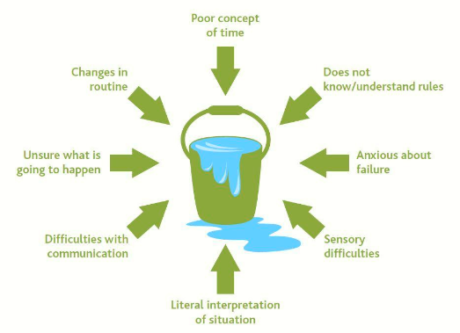
Is it autism?
The characteristics of autism vary from one person to another, but in order for a diagnosis to be made, a person will usually be assessed as having had persistent difficulties with social communication and social interaction and restricted and repetitive patterns of behaviors, activities or interests since early childhood, to the extent that these “limit and impair everyday functioning”.
Children can be diagnosed as autistic when they’re quite young, in some cases from the age of two. But not everyone is diagnosed early in life. It’s quite common for a child to not get their diagnosis until they are older, or even an adult, particularly if they don’t have accompanying learning disabilities.
Some of the main signs that a child may be on the autism spectrum include:
- not drawing their parents’ or others’ attention to objects or events, for example pointing at a toy or a book, or at something that is happening nearby (or a child may eventually do this, but later than expected)
- carrying out activities in a repetitive way, for example always playing the same game in the same way, or repeatedly lining toys up in a particular order
- resistance to change or doing things differently
- emerging difficulties with social interaction and social communication
- behaviour such as biting, pinching, kicking, pica (putting inedible items in the mouth), or self-injurious behavior.





-
Add a note